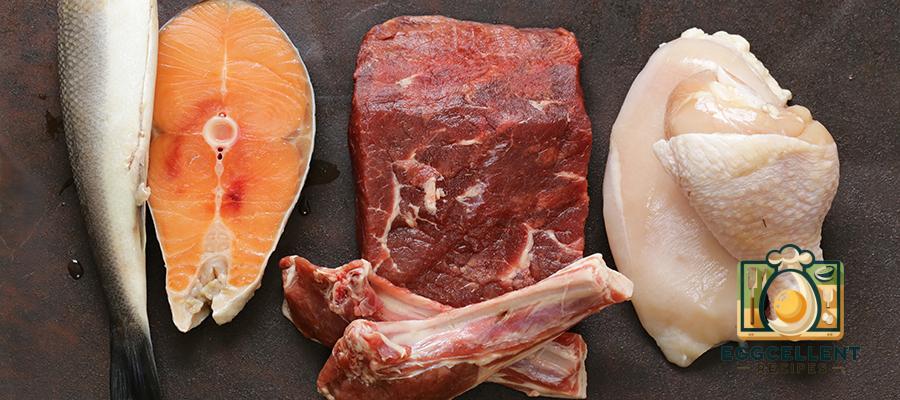
When it comes to choosing between meat and fish, many people wonder which option is healthier. Both are excellent sources of protein and essential nutrients, but they differ significantly in terms of their health benefits and potential risks. In this article, we’ll compare the nutritional profiles of meat and fish, examine their impact on health, and help you make informed decisions about which one to prioritize in your diet.
Nutritional Comparison of Meat and Fish
Both meat and fish provide high-quality protein, which is essential for muscle repair, immune function, and overall body health. However, the types of fats, vitamins, and minerals they contain can vary significantly.
Meat: Nutrient Profile

Red meat (such as beef, lamb, and pork) and white meat (such as chicken and turkey) are rich in protein, vitamins, and minerals, including:
- Protein: Meat is an excellent source of complete protein, providing all nine essential amino acids.
- Iron: Red meat, in particular, is high in heme iron, which is more easily absorbed by the body than the non-heme iron found in plant sources.
- Vitamin B12: Meat, especially red meat, is a good source of vitamin B12, which is essential for nerve function and the production of red blood cells.
- Zinc: Meat provides zinc, an important mineral for immune function, wound healing, and cell division.
However, red meat can also be high in saturated fats and cholesterol, which, when consumed in excess, have been linked to heart disease and other health issues.
Fish: Nutrient Profile
Fish offers a similar high-quality protein but differs from meat in its fat content and types of nutrients:
- Omega-3 Fatty Acids: Fatty fish like salmon, mackerel, sardines, and trout are excellent sources of omega-3 fatty acids, which are essential for heart health, brain function, and reducing inflammation.
- Vitamin D: Fatty fish are also one of the few natural dietary sources of vitamin D, which is important for bone health and immune function.
- Lean Protein: Many types of fish, such as cod, tilapia, and haddock, are low in fat but rich in protein, making them a good option for weight management.
- Iodine: Fish, especially seafood, is a great source of iodine, which supports thyroid function.
Health Benefits of Meat vs. Fish
Benefits of Eating Meat
- Rich in Iron: Red meat is a top source of heme iron, which is more readily absorbed by the body and helps prevent iron-deficiency anemia.
- High in Protein: Meat is a complete protein source, making it ideal for muscle building and tissue repair.
- Vitamins and Minerals: Meat provides essential vitamins like B12, niacin, and zinc, which are important for various bodily functions, including the immune system and metabolism.
Potential Risks of Meat
- Saturated Fat and Cholesterol: Red meat and processed meats like bacon, sausage, and deli meats can be high in saturated fats and cholesterol, increasing the risk of heart disease when consumed in excess.
- Cancer Risk: Studies have shown that frequent consumption of red and processed meats is linked to an increased risk of colorectal cancer.
- Inflammation: Excessive consumption of certain meats, especially processed varieties, can contribute to chronic inflammation in the body, which is associated with numerous health problems.
Benefits of Eating Fish
- Heart Health: Fish, particularly fatty fish, is rich in omega-3 fatty acids, which help reduce inflammation, lower blood pressure, and improve overall heart health. Regular fish consumption has been linked to a lower risk of heart attacks and strokes.
- Brain Health: Omega-3s in fish are also beneficial for brain function and development. Studies suggest that consuming fish regularly can reduce the risk of cognitive decline and improve memory.
- Lower in Saturated Fat: Fish is generally lower in saturated fat than red meat, making it a healthier option for maintaining a balanced diet and managing cholesterol levels.
- Reduced Risk of Chronic Diseases: The anti-inflammatory properties of omega-3s help reduce the risk of chronic diseases such as arthritis, type 2 diabetes, and certain cancers.
Potential Risks of Fish
- Mercury Contamination: Some types of fish, especially larger species like shark, swordfish, and king mackerel, can contain high levels of mercury, which can be harmful, particularly for pregnant women and young children.
- Overfishing and Sustainability: Overfishing of certain fish species can have a negative impact on the environment and the ecosystem. It’s important to choose sustainable fish options where possible.
Which Is Healthier?

For Heart Health: Fish Wins
Fish, particularly fatty fish rich in omega-3s, is the clear winner when it comes to heart health. Omega-3s help lower bad cholesterol (LDL) levels, reduce inflammation, and improve cardiovascular function. Regular consumption of fish is associated with a lower risk of heart disease and stroke.
For Muscle Building: Tie
Both meat and fish provide high-quality protein, making them equally beneficial for muscle repair and growth. If you are focused on building muscle, both can be valuable in your diet.
For Reducing Inflammation: Fish Wins
Fish, especially those rich in omega-3 fatty acids, is known for its anti-inflammatory properties. Meat, particularly processed and red meats, can increase inflammation when consumed in large amounts, making fish a better choice for reducing inflammation.
For Iron Intake: Meat Wins
If you are at risk of iron deficiency or anemia, red meat is an excellent source of heme iron, which is more easily absorbed than the iron found in fish or plant-based foods.
Balance Is Key
Ultimately, both meat and fish can be part of a healthy diet, but balance is important. To enjoy the benefits of both, try incorporating more fish into your meals while limiting your consumption of red and processed meats. Choose lean cuts of meat like chicken or turkey and opt for grass-fed, organic, or pasture-raised options when possible.
Tips for Eating Healthier Meat and Fish
- Opt for Lean Cuts: Choose leaner cuts of meat like chicken breast, turkey, or lean beef to reduce saturated fat intake.
- Bake, Grill, or Broil: Use healthier cooking methods like baking, grilling, or broiling instead of frying.
- Choose Sustainable Fish: When buying fish, look for sustainably sourced options like wild-caught salmon or farm-raised fish from responsible sources.
- Vary Your Protein Sources: Balance your diet with a mix of meat, fish, plant-based proteins (like beans, lentils, and tofu), and eggs to get a wide range of nutrients.
Both meat and fish offer valuable nutrients that are essential for a healthy diet. Fish, particularly fatty fish, stands out for its heart and brain health benefits, while lean meats provide rich sources of protein, iron, and other vital nutrients. To optimize your health, focus on balance, incorporating a variety of protein sources into your meals, and emphasizing whole, unprocessed foods. By making informed choices, you can enjoy the best of both meat and fish while supporting your overall health and well-being.






